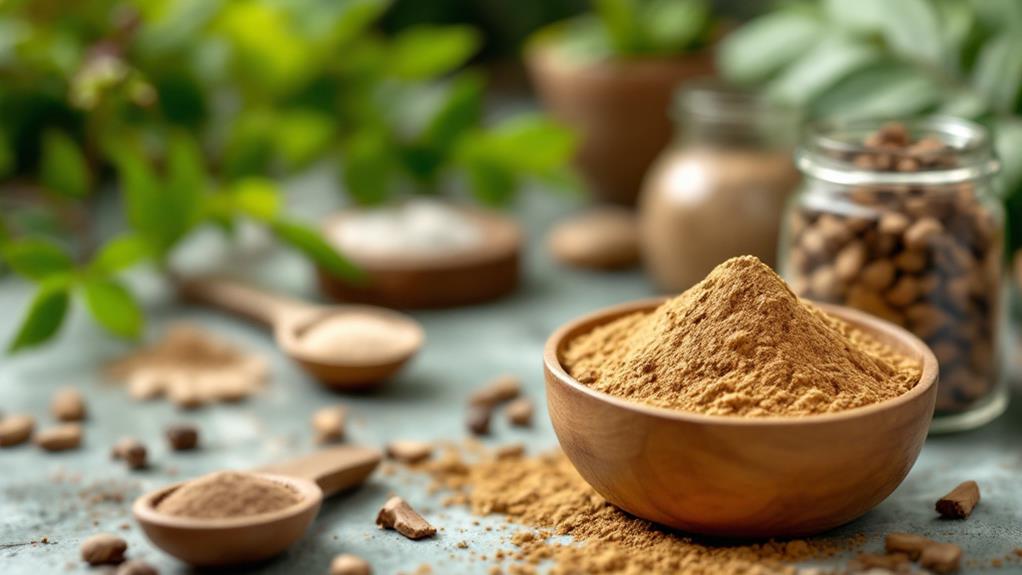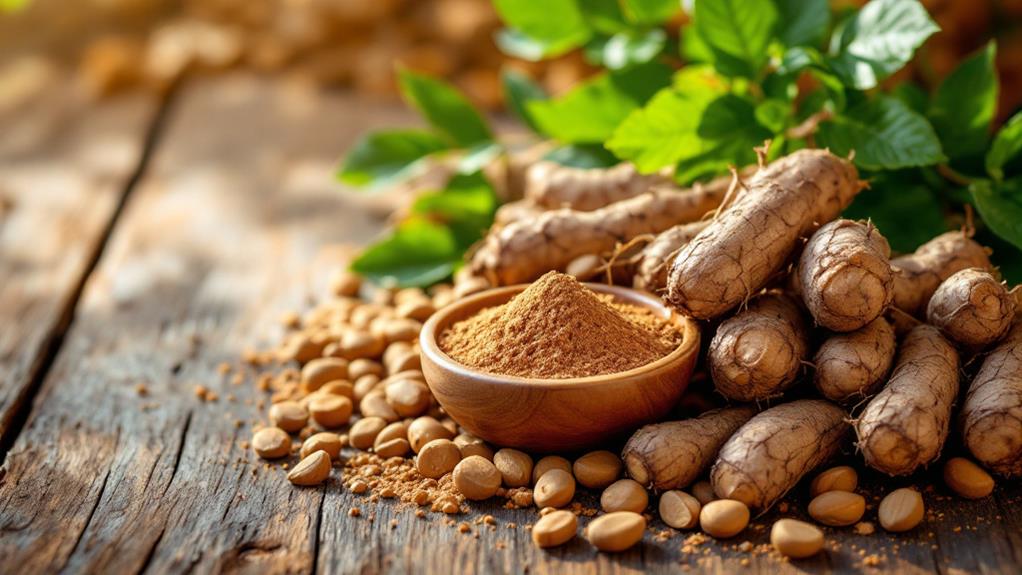Maca Root: Can It Improve Menopause and Fertility Health?

You can consider incorporating maca root into your routine to help with menopause and fertility health. It supports hormonal balance, which alleviates symptoms like hot flashes and sleep disturbances. For fertility, maca root can improve sexual function and is linked to better sperm concentration in males. Packed with nutrients like vitamins, minerals, and amino acids, it offers benefits beyond hormones. However, make certain you start with a low dosage and consult a healthcare professional, especially if you have hormone-sensitive conditions. To investigate more about how maca's adaptogenic properties can benefit your comprehensive health, keep going.
Understanding Maca Root
In the domain of natural remedies, maca root stands out for its long history and potential health benefits. Known scientifically as Lepidium meyenii, this cruciferous vegetable from the Peruvian Andes has been cultivated for over 2,000 years. It's praised for its ability to support hormonal balance and improve fertility. Maca root's rich composition of vitamins and minerals, along with vital amino acids and bioactive compounds like macamides, contributes to its health-promoting properties.
For those experiencing menopause, maca root may offer relief by alleviating symptoms such as hot flashes and mood swings. Its potential to support hormonal balance is particularly beneficial for postmenopausal women. Furthermore, if you're looking to increase fertility, maca root could be a valuable supplement to your routine. Research indicates it can enhance sperm concentration in men, with a 2020 study showing significant effects after 12 weeks of daily intake.
Typically available in powder and capsule forms, maca root should be taken in doses ranging from 1.5 to 3 grams per day. However, it's always best to consult a healthcare professional for personalized advice on daily intake.
Nutritional Profile
Maca root boasts a robust nutritional profile that makes it a powerhouse improvement to any diet. It's approximately 14% protein by weight and contains vital amino acids, making it a valuable source of nutrition. These amino acids are building blocks for your body, supporting muscle growth and repair. Maca is rich in vitamins like B vitamins, vitamin C, and vitamin E, which contribute to general health and well-being. These vitamins play significant roles in energy production, immune function, and skin health.
Furthermore, Maca is a fantastic source of minerals, including calcium, potassium, iron, and magnesium. These minerals are important for bodily functions and help maintain energy levels, support bone health, and promote proper muscle function. The root is also high in dietary fiber, aiding digestion and promoting a healthy gut.
Maca contains bioactive compounds such as macamides and glucosinolates, which may offer further health benefits. These compounds have been studied for their potential cancer-preventive properties and general positive impact on health. With its impressive nutritional profile, incorporating Maca into your diet can support your body's health needs and potentially elevate your energy levels.
Menopause Benefits

Ever wondered how to naturally ease the discomforts of menopause? Maca root might just be your answer. It's gaining attention as a natural alternative to hormone replacement therapy, particularly for postmenopausal women. Known for its potential to alleviate menopausal symptoms, maca helps achieve hormonal balance, reducing hot flashes and sleep disturbances. By supporting hormonal balance, maca root offers a non-hormonal way to tackle the challenges of menopause.
But that's not all. Maca's benefits extend to improving sexual function, which can be a concern during menopause. A 2015 study even highlighted its role in improving sexual function in women experiencing antidepressant-induced sexual dysfunction. This makes maca a promising option for maintaining sexual health.
In addition to physical symptoms, maca addresses emotional well-being. It may help reduce depression and anxiety, common companions during menopause. By promoting emotional stability, maca can support a smoother passage through this life stage.
Here's a quick rundown of maca root's menopause benefits:
- Alleviates hot flashes and sleep disturbances
- Supports hormonal balance for postmenopausal women
- Improves sexual function
- Reduces symptoms of depression and anxiety
- Offers a natural alternative to hormone replacement therapy
Give maca root a try and see if it transforms your menopausal experience.
Enhancing Fertility
While often celebrated for its benefits during menopause, maca root also holds promise in improving fertility. Used as a dietary supplement, it's been linked to advancements in male reproductive health. A 2020 study found that taking 2 grams of maca daily for 12 weeks markedly increased sperm concentration. This suggests that maca could play a key role in supporting reproductive health by potentially enhancing semen quality in both fertile and infertile men.
For women, maca root may indirectly improve fertility by enhancing sexual function and reducing antidepressant-induced sexual dysfunction. These benefits can lead to increased libido, which is vital for fertility. Additionally, maca is believed to help balance hormones, offering support during periods of hormonal fluctuation such as perimenopause. By stabilizing hormone levels, maca could contribute to better reproductive health and reduced menopausal symptoms.
However, while the evidence is promising, it's crucial to keep in mind that results can vary, and more research is needed to fully understand maca's impact on fertility. If you're considering maca root as a fertility supplement, consulting with a healthcare professional can offer personalized advice and confirm it fits well with your reproductive health goals.
Sexual Health Impact

When contemplating the sexual health impact of maca root, it's clear that this natural supplement offers promising benefits. If you're experiencing sexual dysfunction, particularly from antidepressant use, maca root might be a solution. Studies have shown that it can enhance libido and satisfaction, making it a valuable ally in your sexual health path. For men, maca root is known to increase sexual desire. A study from 2002 found that daily consumption of maca resulted in a noticeable improvement in sexual interest.
Maca root isn't just about increasing libido. Its adaptogenic properties help maintain hormonal balance, which can be beneficial during menopause. By alleviating menopausal symptoms like hot flashes and mood swings, it helps maintain your comprehensive sexual health. Moreover, maca root has been linked to improved semen quality, positively impacting male fertility by increasing sperm concentration.
Here are some key points to reflect on:
- Maca root may enhance sexual function in women with antidepressant-induced dysfunction.
- It can elevate libido and sexual desire in men.
- Supports hormonal balance, easing menopausal symptoms.
- May improve semen quality and fertility.
- Offers adaptogenic properties that help manage stress and hormonal changes.
Incorporating maca root might just be the enhancement your sexual health needs.
Potential Side Effects
As you consider adding maca root to your health regimen, it is vital to be aware of its potential side effects. Some individuals experience digestive issues like bloating or gas after consuming maca root. It's significant to monitor how your body reacts and adjust your intake accordingly. If you're pregnant or breastfeeding, it's generally advised to avoid maca root. Its effects on hormonal balance during these stages aren't well-studied, and safety concerns remain.
Moreover, if you have hormone-sensitive conditions such as breast or ovarian cancer, steer clear of maca root. The hormonal effects of maca aren't fully understood and could potentially worsen these conditions. Mild side effects might include mood swings, cramping, insomnia, and changes in menstrual cycles. These symptoms underscore the need for moderation and careful observation of how maca impacts you.
Dosage and Safety Considerations

After considering the potential side effects of maca root, it's vital to focus on the appropriate dosage and safety measures. Typical studies suggest a dosage ranging from 1.5 to 3 grams daily for maca root, but there's no established ideal dose specifically for menopause or fertility health. So, moderation is key. Consulting healthcare professionals is fundamental to tailor dosage recommendations to your unique health status and to check for potential interactions, especially if you have hormone-sensitive conditions.
While maca root is generally safe up to 3 grams, certain groups should proceed with caution. Individuals with hormone-sensitive cancers or those who are pregnant, breastfeeding, or on anticoagulants should avoid maca root without prior medical consultation. It's significant to monitor for potential side effects such as digestive issues, mood changes, and insomnia. These emphasize the need for moderation and careful observation of how your body responds.
Here's a quick checklist to guide you:
- Consult healthcare professionals before starting.
- Start with a low dose and adjust gradually.
- Monitor for any adverse effects.
- Avoid if you have hormone-sensitive conditions or are pregnant.
- Stick to recommended dosages to guarantee safety.




